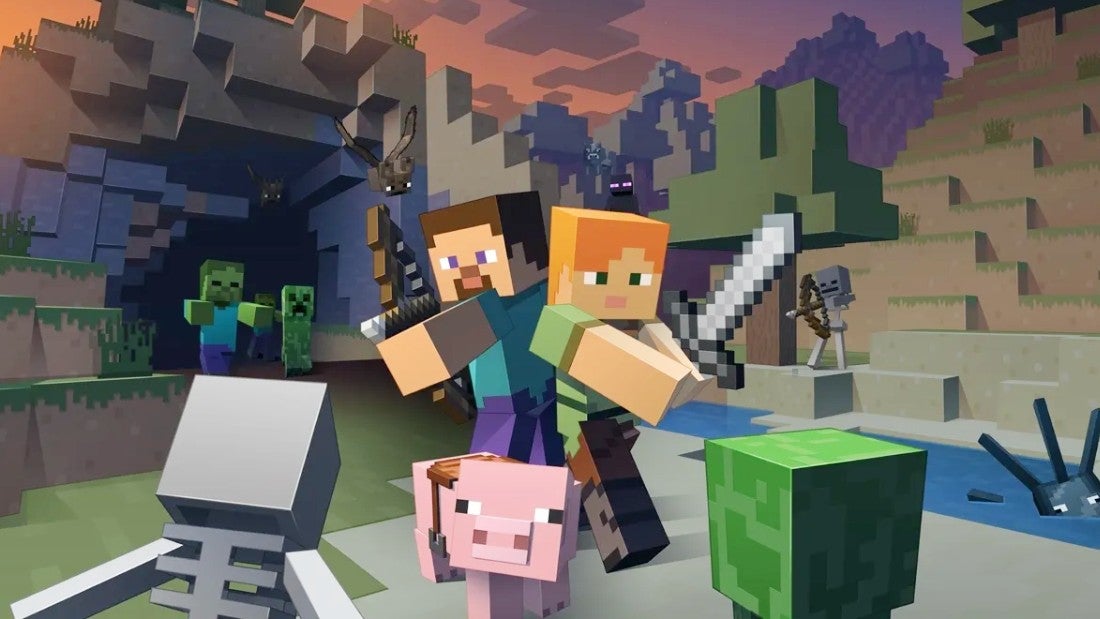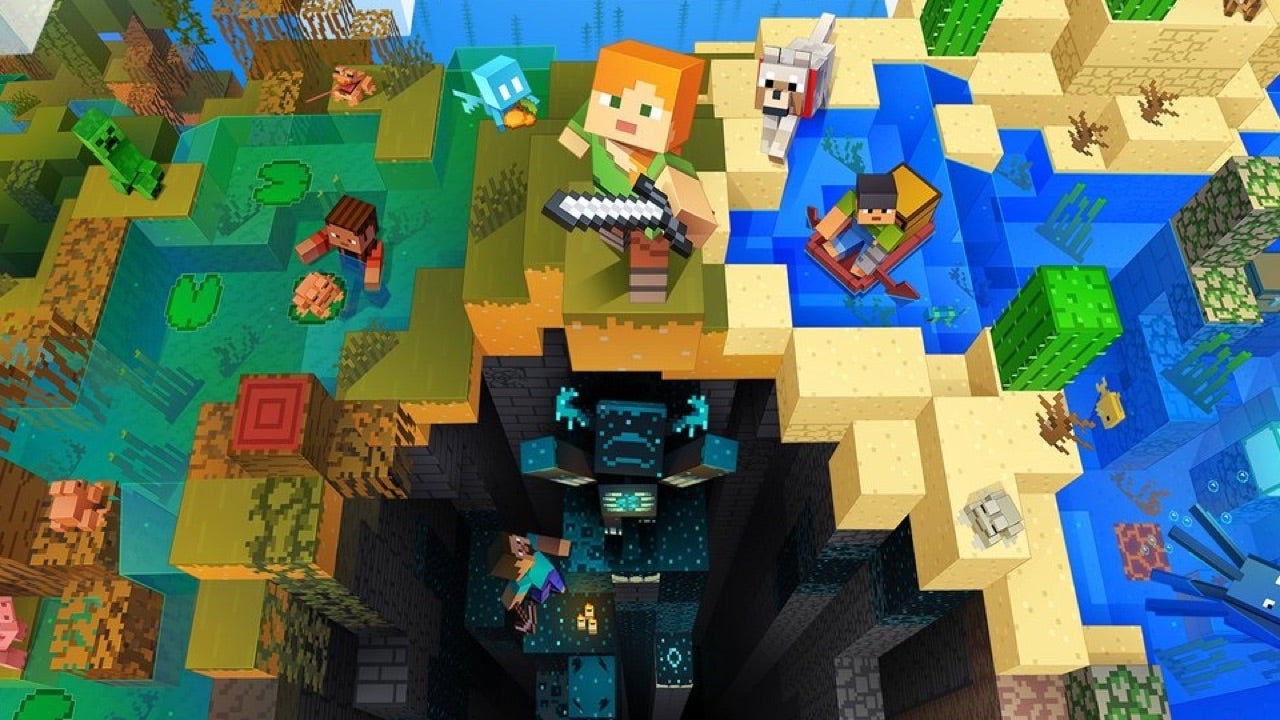My Minecraft expert is nine years old, and she’s an expert in Minecraft in the way that only a nine-year-old can be an expert in a game. Minecraft is a ready metaphor for everything in her life, but she’s also deeply engaged in the minutiae of it. She has no fear of its depths and complexities. I went through a period of thinking it was sort of sad that she didn’t draw in the evenings as much any more or play with her doll’s house, but now I realise: she still does this stuff. She just sometimes does it in Minecraft, and it’s all evolved and started to flow together: drawing, playing, landscape and imagination. Let’s go back a bit. Like a lot of kids, ours has three or four games that come in and out of favour as the weeks pass. Minecraft, though, is the game that all the others orbit - it’s always in the number one spot. In many ways it’s the game she measures all other games by. And that in itself is interesting. From an admittedly small sample group, the things her generation seems to want from games are very specific. They don’t seem to care about graphics at all, and campaigns are fine - the first game we finished as a family was A Short Hike and we were delighted to get to the top of the mountain - but they come third or fourth or fifth in order of importance behind things like community and self-expression and just lounging, man. My daughter’s class got into Fortnite through the party mode, where you wander about dancing at each other. Games are places where these kids come together to hang out and be themselves, together. They’re an extension of the playground. Minecraft excels in this role. Its world is endless so you can team up and build stuff in groups but also - this is vital - you can lose interest and drift away and do something else without actually leaving. You can play alongside your friends while doing your own thing. And what you do in Minecraft is kind of a definition of who you are. “I’m a builder,” my daughter explains. And it’s true. She builds incredible stuff - incredible to me and my wife. She built her school in there. The local park. The community supermarket. And that’s just the stuff she carried across from our world. All these builds are problem solving. Not just the redstone kind of thing, of “how do I get the doors to open when I step on the pressure plate?” (Door-and-pressure-plate isn’t enough by itself, incidentally: after an early house, built into the side of a mansion, was invaded by mobs, one of whom ended up stuck in her bed, my daughter rigged up a bell that chimes every time the door opens. Security.) The problem solving goes deeper. When I ask what she most wants from a future Minecraft update she has very clear ideas. “Furniture. Yeah, like maybe an easy way to make a counter or something,” she tells me. “Or maybe you could actually place stuff on slabs, because right now you can’t because they’re kind of only a half-block, so anything that you put on it, like a plant pot, it’s always floating.” Floating plant pots, no decent counters. These are the things the committed Minecraft builder needs to come up with their own solutions for. My builder approached the recentish 1.19 update in her own way. 1.19 is the Wild Update, BTW, bringing with it frogs - she loves the frogs - as well as a load of new blocks and biomes - mangroves! Deep Dark caves! - and things like that. To get her head around it, she built a train that moves through all the old blocks that are in the game, and then into an island that’s purely made from the new blocks. “And a bit of sand and stuff.” She loves mud bricks. She loves the new kind of wood. I reviewed Minecraft for a magazine a very long time ago, and I hadn’t really played much since. Now we have our own family area where one of us (not me) builds very beautiful houses and villages, and then I make weird bookcase labyrinths and accidentally set them on fire. We play alongside each other, and intermittently we team up on something. Last week she showed me how you could create huge stone towers by creating lava flows and then dousing it in water. You get something that almost looks like the inside of a medieval cathedral - all these pillars and vertical chambers. Beautiful! All of which is to say that the question I’m faced with now is the question I struggled with back when, long before I had a child, I tried to review Minecraft for that magazine. What’s the state of this game? How can you get your arms around it? It’s so big, it means so many things to so many people. What can you do in the face of how vast it is, how many possibilities it contains? Here are a few simple observations, at least. Minecraft is a bit timeless, I think. By which I mean, each generation comes to it and feels like they discovered it first. I could tell my daughter how old Minecraft actually is, but I don’t think she’d believe me. It’s the island that she and her class discovered for themselves. It’s a thing that she tells me about, because she assumes I’ve never heard of it before. Minecraft’s also the epitome of an open-ended game, and this has survived everything that’s been added to it over the years. My daughter’s a builder, but she has friends who are decorators, explorers, demolition experts, and people who just try to break the game and see something nobody else has seen. All of this is legit. Minecraft has an ending - my daughter gets very tangled up trying to explain it - but it doesn’t really matter. Goals are what you want to do in the next five minutes here. Ten minutes if you’re adding furniture. Minecraft’s not finished. And this is a big part of why Minecraft is so brilliant. Most of the time, when talking of the Wild Update, my daughter comes back to the idea that it fixes things - or attempts to fix things - that were broken. The caves used to be boring. The swamps used to be boring. So they add new stuff. There are frogs now! That warden fellow. Allies. But she’s always clear that none of this stuff is done. Nothing is fixed for good, and it shouldn’t be, and that’s why the game feels alive. Next, my daughter’s heard, you may be able to breed Allays by giving them a cookie. And maybe the developers will fix up some of the other biomes. And then there’s new wood types, and the eternal hope that they’ll add more furniture and proper counters, dammit. For years when I thought of Minecraft I thought of something daunting, too vast to get involved with. It would be like trying to become a Brian Eno fan at this stage in my life. Where do you start? (Here Come the Warm Jets, but that’s beside the point.) Now when I think of Minecraft I think about a specific sound - a fast, confident clicking. It’s the sound of my daughter’s hands on the controller as she moves through the world she’s building, shaping it, tweaking it, constructing things that she has in her mind or sketched out on a bit of paper, or capitalising on happy accidents. To put it slightly differently, to me, Minecraft’s always been a game in which other people did incredible things and built incredible things. Now I share a house and a TV with one of those people. What’s the state of Minecraft at the moment? It’s still new. It’s still exciting. And it’s still revelatory. I mean that. Pardon the gear shift, but if you’re a parent you may know this fear: the fear that your kids are going to have to go out into the world, and do they know enough to get by? I am what’s called a helicopter parent - I hover and fuss and make sure nobody bangs their head or jams a fork in a plug socket. Sometimes this means I make sure nobody has any fun. But Minecraft, of all things, has helped me change this behaviour just a bit. Because the daughter it shows to me is as kind and thoughtful as the kid I already know, but also wildly, panoramically competent and capable. She can do stuff with speed and accuracy and imagination and care that I can only dream of. Of course she can. She’s a builder. This piece is part of our State of the Game series, where we check in on some of the biggest service games running to see how they’re getting on. You can find plenty more pieces like it in our State of the Game hub.

